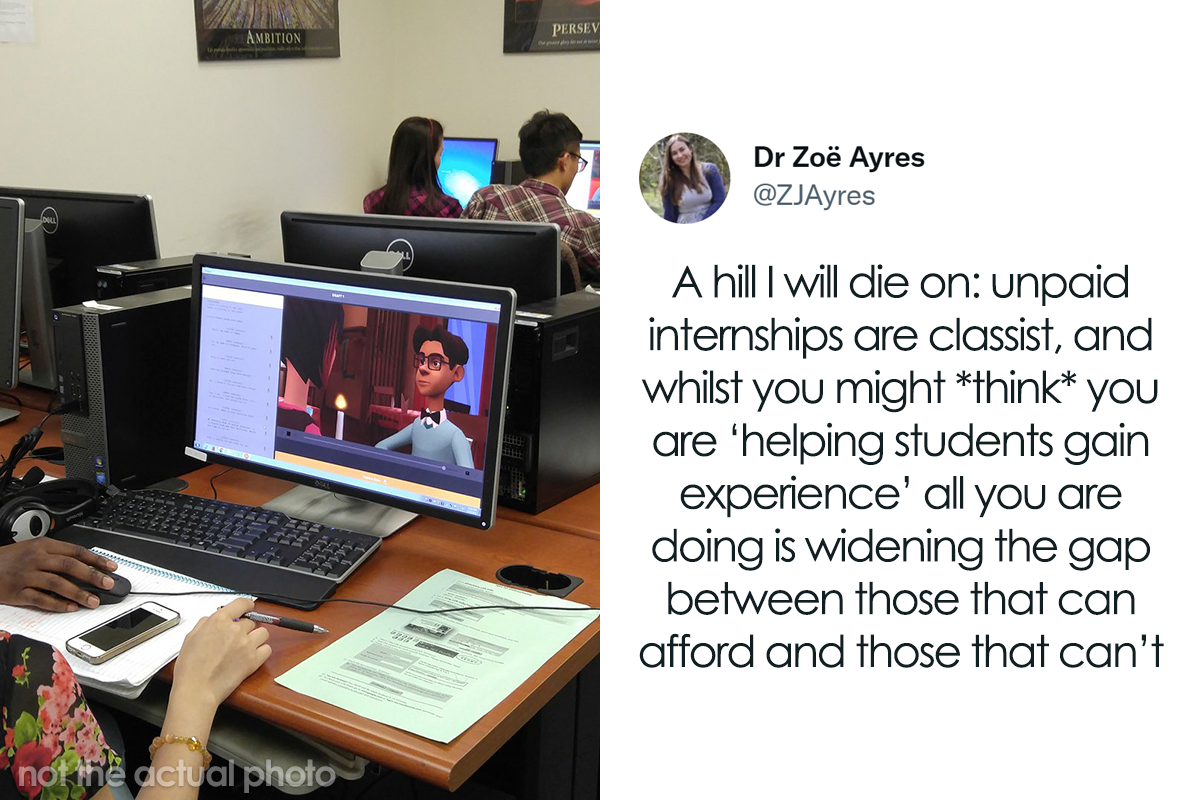
“A Hill I Will Die On”: Twitter User Speaks Out Against Unpaid Internships For Students, Sparks A Discussion Online
Recently we wrote that any work must be paid, and this is a fundamental principle of the world economy. We talked about a hapless teen petsitter who didn’t get paid by his employers because he was negligent in his duties, lost their house key, and, on top of that, let the cat he was supposed to take care of run away.
But even in this situation, when instead of a job well done, his employers received several days of anxiety and the need to change the locks in the whole house, the opinions of the readers were still divided, and many believed that if the work took place, then it should still be paid somehow.
At the same time, there is a whole field of activity where people quite officially spend their time, effort, knowledge and skills, while receiving absolutely no pay in return. And society is quite loyal to this – we just call it unpaid internships!
Dr. Zoë Ayres, Head of R&D and academic mental health advocate from the UK, recently brought up this topic in a series of Twitter posts, sparking a heated discussion. According to the author, unpaid internships are, if not an absolute evil, then definitely somewhere nearby, and Dr. Ayres provides ample evidence in support of her point of view.
More info: Twitter
The British academic mental health advocate believes that unpaid internships really shouldn’t be a thing at all
Image credits: Charity Davenport (not the actual photo)
So, according to Dr. Ayres, unpaid internships are positioned as a great opportunity for students to gain work experience in a large company or organization, expand their professional circle, improve their work skills – it would seem that there are only advantages… But everything is actually far from being as simple as it might seem at first glance.
Image credits: ZJAyres
Image credits: ZJAyres
Unpaid internships could be considered undermining the very idea of equality of all people
According to the author, unpaid internships undermine the very idea of equality of people, because they are de facto available only to those who can afford them financially. Indeed, there are hundreds and thousands of examples of how people had to refuse an interesting and incredibly useful internship for their future career simply because at that time they had to find a side job to earn a living or raise money to continue their studies.
Image credits: ZJAyres
Image credits: ZJAyres
As a result, according to the Original Poster, access to such internships is likely not to be given to the most capable students, but only to those who have the financial ability. In other words, the system of unpaid internships, according to Dr. Ayres, only contributes to the stratification of society according to the monetary criterion.
Image credits: ZJAyres
Image credits: ZJAyres
Even non-profit organizations should actually find some opportunities to arrange paid internships, the author believes
But what about, for example, museums or other non-profit organizations that themselves cannot afford to organize paid internships due to their own insufficient funding? Is it possible to refuse internships altogether? No way, says the author. It’s just that the higher-ups of such organizations should leave their comfort zone and try, for example, to find sponsors or patrons to pay for the interns’ work. In any case, it will be more fair, claims the OP.
Image credits: ZJAyres
It must be admitted that Dr. Ayres is right about a lot of things, and she’s not the only one raising this issue. “To me, this was more surprising,” Harvard Business Review quotes Joshua Kahn, Assistant Director of Research and Public Policy at the National Association of Colleges and Employers (NACE Foundation). “We always knew that there are differences between paid and unpaid interns, but the fact that unpaid interns did not have an advantage over those without an internship is a significant finding.”
Image credits: ZJAyres
Image credits: ZJAyres
According to academic study results, unpaid internship participation exhibits a negative impact on graduate employment outcomes
Moreover, the results of a study conducted back in 2016 by the NACE Foundation confirmed that unpaid internship participation exhibits a negative impact on graduate employment outcomes. Additionally, unpaid internships were shown to play significantly different roles in student career development than paid internships, particularly in regard to professional skill development and academic performance.
Image credits: icehristream
“Our pay is experience,” the Original Poster quoted many employers, but she couldn’t agree less. “I genuinely can’t get over how many people in this thread couldn’t take opportunities because they couldn’t afford to. We’ve got to do better than this,” says Dr. Ayres.
Image credits: frankieleon (not the actual photo)
However, people’s opinion on the topic of unpaid internships in the comments was divided
We must also say that not all the people in the comments share the OP’s point of view. Moreover, some commenters recall their time as unpaid interns with great fondness and say that it was one of the best times of their lives. On the other hand, nostalgia for the days of their youth is a very common thing among people, and who knows, maybe these commenters are just nostalgic for their student youth?
Image credits: Macsbooks1
Image credits: LouiseSchenk
Image credits: grimmrad
Image credits: IanSudbery
Image credits: WCphilosopher
Image credits: eestillwell
By the way, some of the commenters fully support Dr. Ayres, noting that a company or organization for some time simply gets an employee who does not need to be paid for their work, and this is contrary to all economic principles and laws of common sense at all. In any case, the problem is ripe, and something needs to be done about it, many people in the comments are sure.
Image credits: writermissyo
Image credits: tangoldman
Image credits: du13ious
Image credits: MrsOdie2
Image credits: catgirrl
Image credits: bonz_us
Image credits: PocketSizeAlex
We’re pretty sure as well that many of you have also interned while seniors at universities, so it’ll be interesting to hear your own stories. And besides, we, as always, are already looking forward to your comments on this very story.
24Kviews
Share on FacebookOne comment said that it is easy to say, that internships have to be paid but the money has to come from somewhere. - i think, they are doing work. Work you usually have to pay for. they are not sitting around doing nothing and the Chef are not sitting around just teaching them skills. They are both doing work (maybe the first weeks are more teaching stuff but then you expect the intern to work)
You just used a great example. A CHEF. At least in my country most tradespeople are paid for their work portions of their apprenticeships, and journeyman states at a rate equivalent to their position of experience in that trade. ABOLISH unpaid internships and then anyone who wants to qualify for unpaid status has to meet a rigorous standard of practice to establish need/$ or redfine the legal specification between volunteer work and intern work and have heavy penalties ( like the wage unpaid +a punitive addition based on how frequent an offender a workplace is) for those who step over the line between volunteer and intern.
Load More Replies...Unpaid internship is exploitation. Period. It's classist bull$hit. How often do coveted internships go to the children of the Wealthy and Connected? Pretty often. It's nepotism, and that's bull$hit, too. Freezing out POC or poor people from "insider jobs" and access to the corridors of power is what this "hiring practice" is about. For example, I worked my a*s off for more than one political candidate as "unpaid volunteer," always received pats-on-back for meeting or exceeding my voter contact goals, etc., but when it came time to hand out PAID OFFICE GIGS after "WE WON," those choice assignments went to... the suck ups, the a*s-kissers, or the CHILDREN of campaign DONORS. >:(
THIS. This is actually a much bigger problem than pay or no pay. Our company pays interns about $60K, but a lot of those internships often go to the children of board members, or potential customers.
Load More Replies...An internship, paid or not, should have measurable learning goals. It should not be "free" labor for the company. Many internships are just sub-entry-level work positions, with virtually no training and ultimately of no benefit other than freeing higher-paid workers of some of their menial tasks. An internship that moves you among the actual working position of a company, shadowing workers throughout their tasks, with no *productivity* expectations, but an opportunity to learn the various types of tasks and how they are approached would be invaluable.
One comment said that it is easy to say, that internships have to be paid but the money has to come from somewhere. - i think, they are doing work. Work you usually have to pay for. they are not sitting around doing nothing and the Chef are not sitting around just teaching them skills. They are both doing work (maybe the first weeks are more teaching stuff but then you expect the intern to work)
You just used a great example. A CHEF. At least in my country most tradespeople are paid for their work portions of their apprenticeships, and journeyman states at a rate equivalent to their position of experience in that trade. ABOLISH unpaid internships and then anyone who wants to qualify for unpaid status has to meet a rigorous standard of practice to establish need/$ or redfine the legal specification between volunteer work and intern work and have heavy penalties ( like the wage unpaid +a punitive addition based on how frequent an offender a workplace is) for those who step over the line between volunteer and intern.
Load More Replies...Unpaid internship is exploitation. Period. It's classist bull$hit. How often do coveted internships go to the children of the Wealthy and Connected? Pretty often. It's nepotism, and that's bull$hit, too. Freezing out POC or poor people from "insider jobs" and access to the corridors of power is what this "hiring practice" is about. For example, I worked my a*s off for more than one political candidate as "unpaid volunteer," always received pats-on-back for meeting or exceeding my voter contact goals, etc., but when it came time to hand out PAID OFFICE GIGS after "WE WON," those choice assignments went to... the suck ups, the a*s-kissers, or the CHILDREN of campaign DONORS. >:(
THIS. This is actually a much bigger problem than pay or no pay. Our company pays interns about $60K, but a lot of those internships often go to the children of board members, or potential customers.
Load More Replies...An internship, paid or not, should have measurable learning goals. It should not be "free" labor for the company. Many internships are just sub-entry-level work positions, with virtually no training and ultimately of no benefit other than freeing higher-paid workers of some of their menial tasks. An internship that moves you among the actual working position of a company, shadowing workers throughout their tasks, with no *productivity* expectations, but an opportunity to learn the various types of tasks and how they are approached would be invaluable.
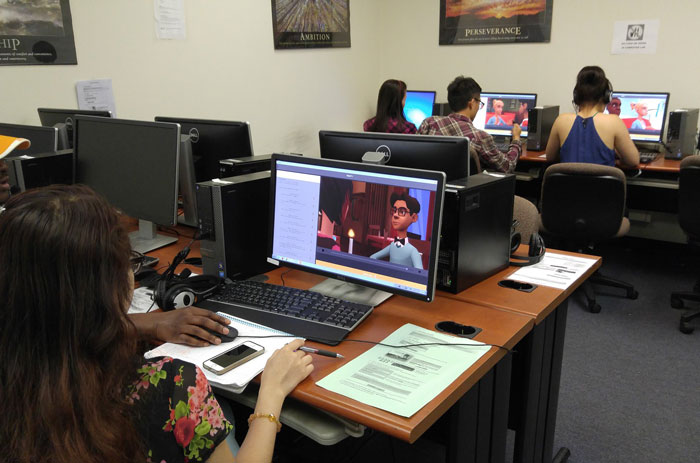
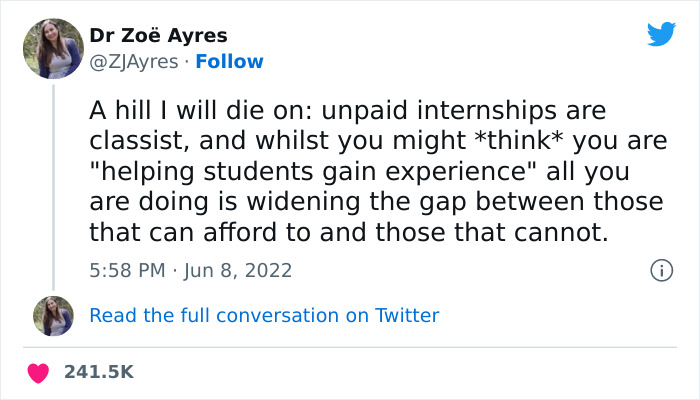
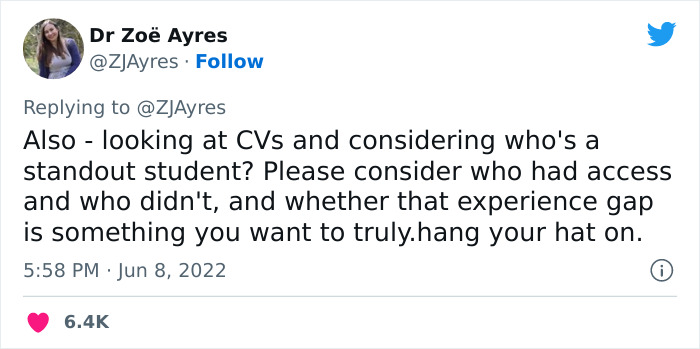
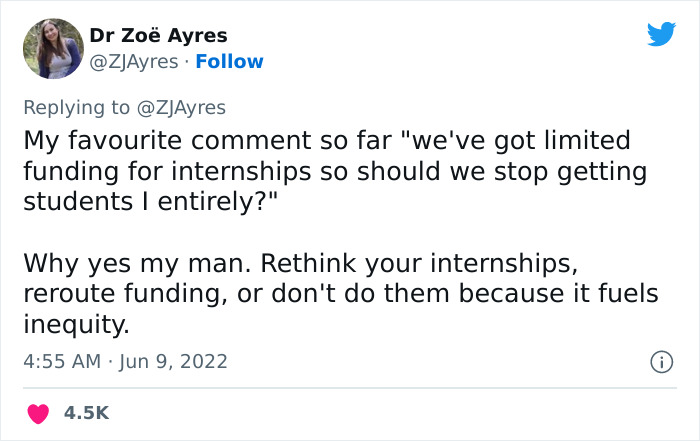
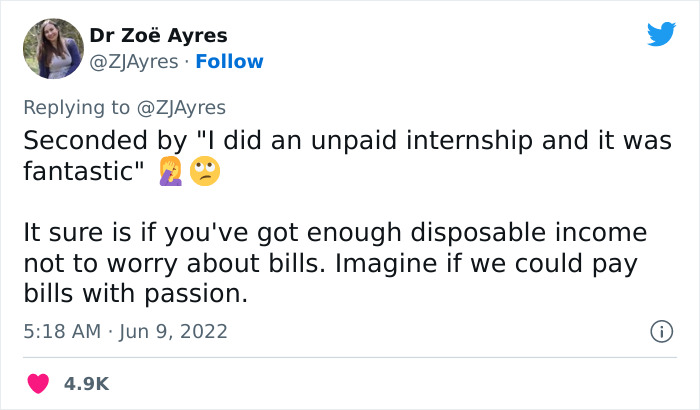
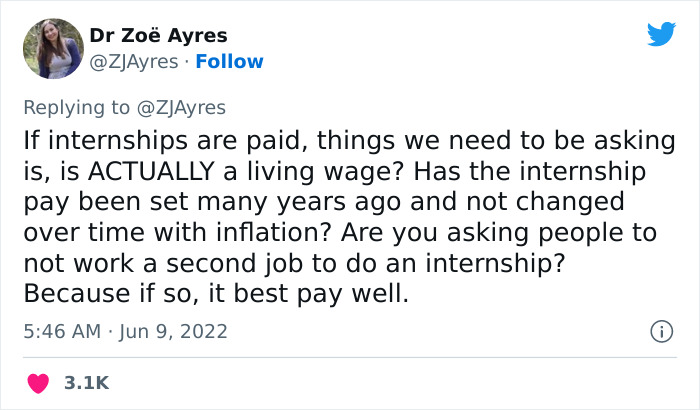
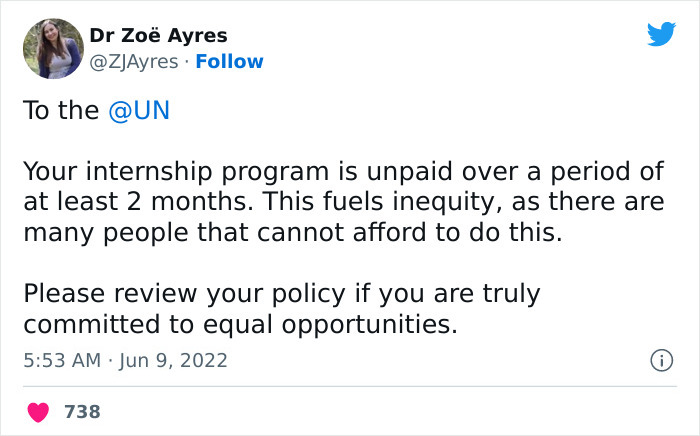
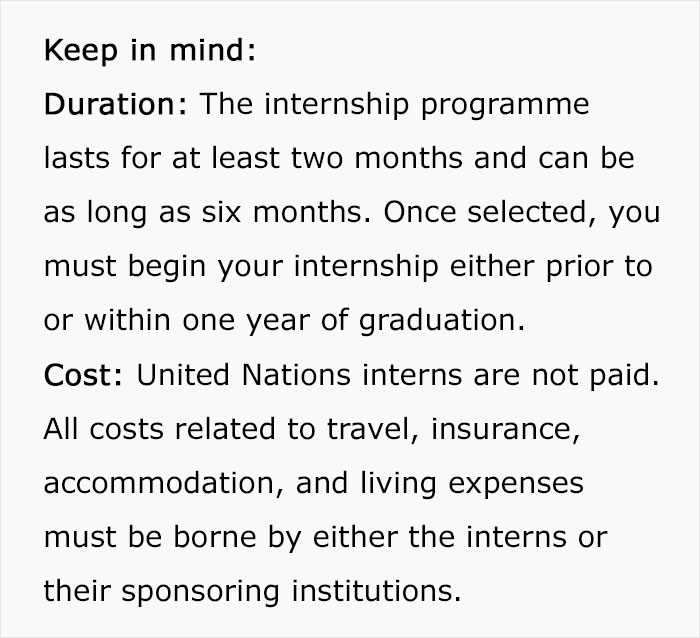
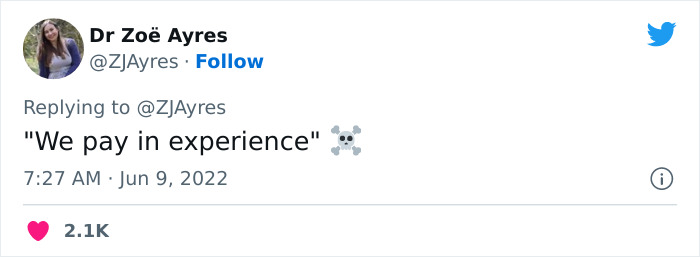
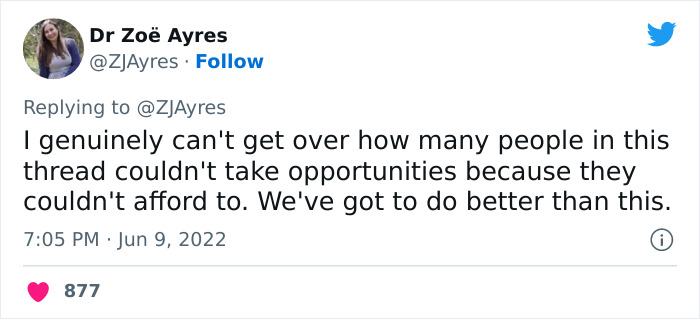
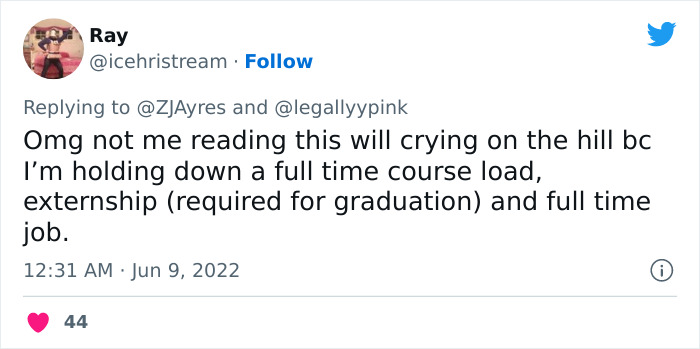

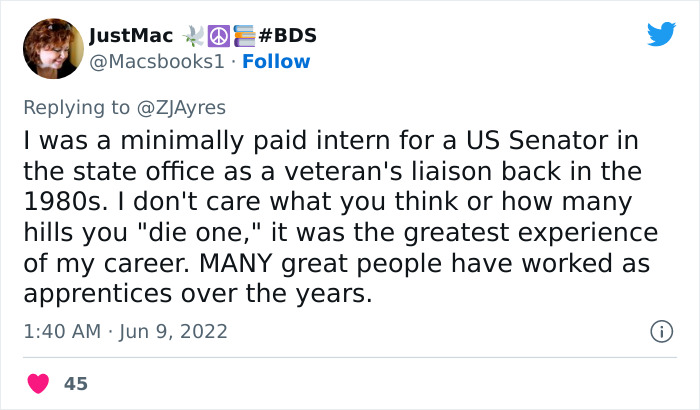
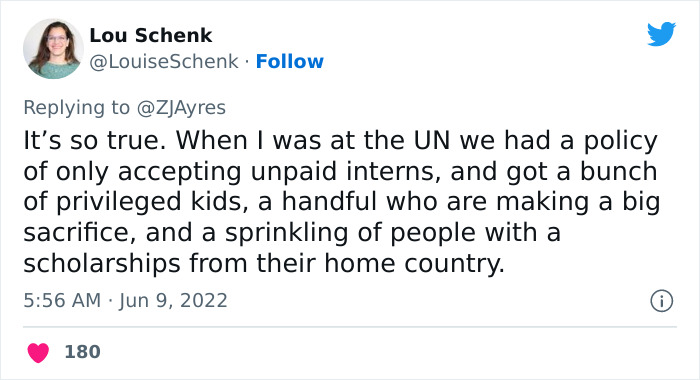
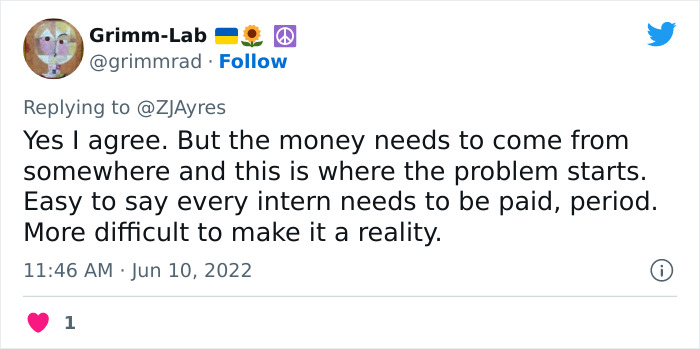
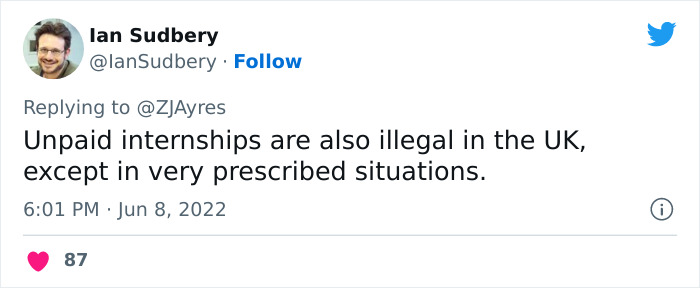
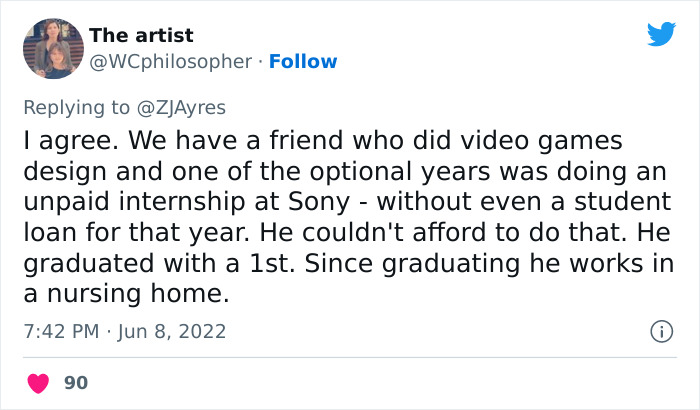
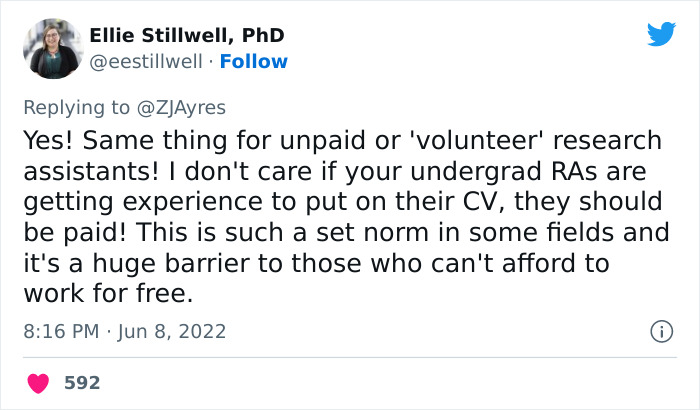
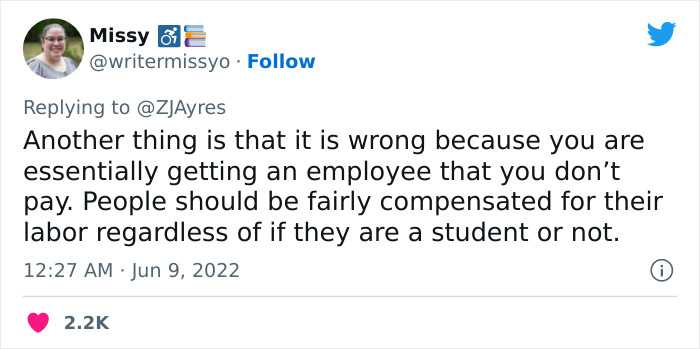
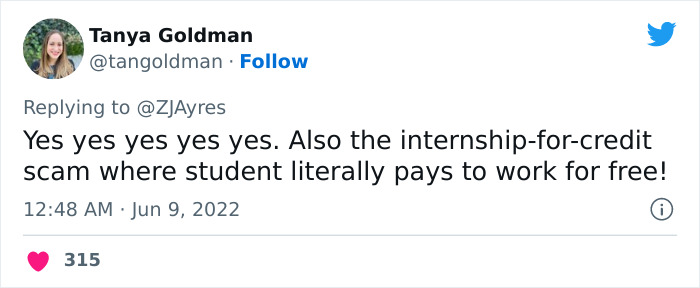
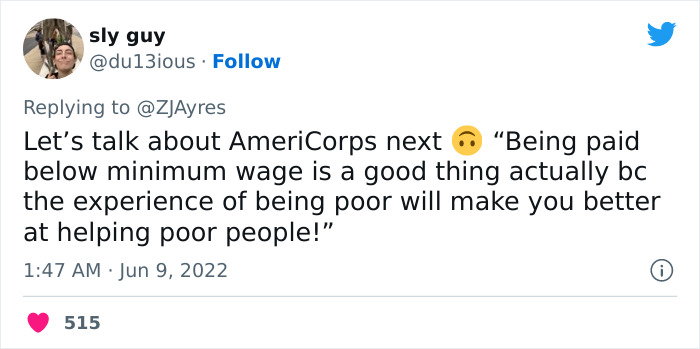
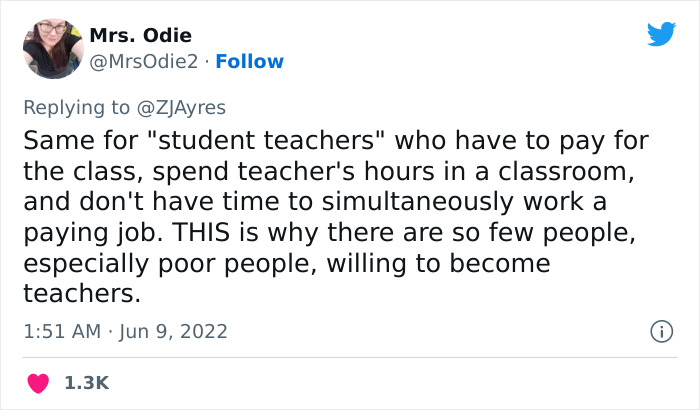
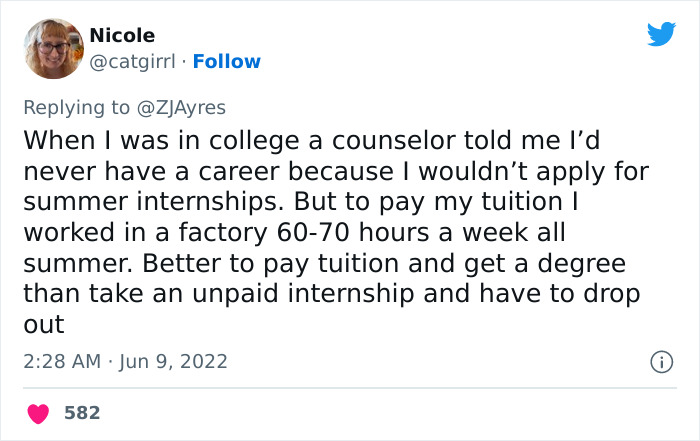
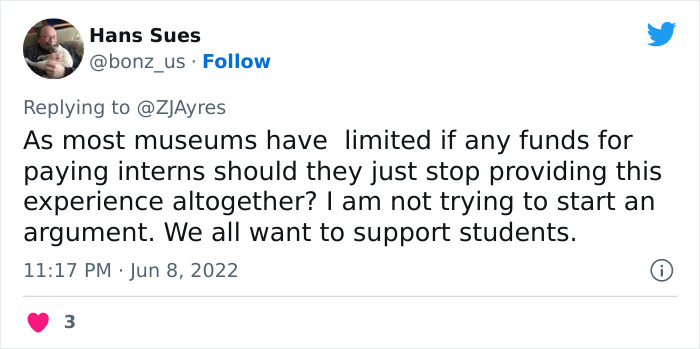
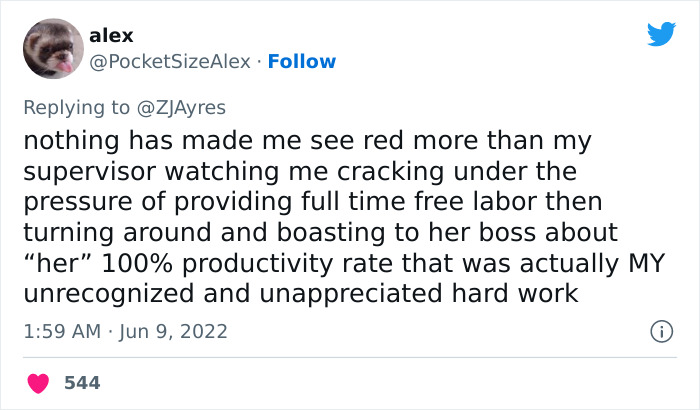




91
51